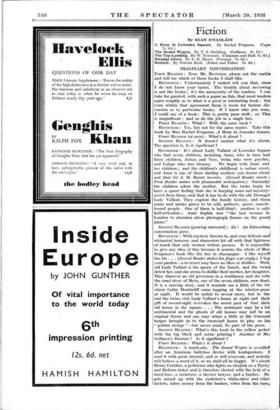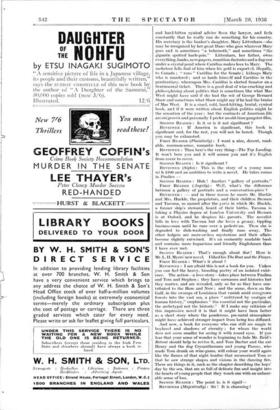Fiction
By SEAN O'FAOLAIN
The Sound Wagon. By T. S. Stribling. (Gollanez. 8s. 6d.) The Top Landing. By W. Townend. (Chapman and Han. 7s. 6c1.),
Strange Glory. By L. H. Myers. (Putnam. 7s. 6d.) - Retreat. By Forrest Reid. , (Faber and Faber. 7s. 6d.) IMAGINARY. CONVERSATION Fnisr READER : Now, Mr. Reviewer, please cut the cackle and tell me which of these books I shall 'like.
REVIEWER : Unfortunately- I cannot tell• you that; sines I do not know your tastes. The trouble about reviewing.
is not the books ; it's the anonymity of the readers. I can take for granted, with such a paper as this, .that. most readers agree roughly as to what is a good or interesting book ; but even within that agreement- there is room for furious dis- cussion as to particular books. If I knew who you were,
I could say of a book : This is pretty poor stuff ; or, This
is magnificent ; and so do the job in -a single line. - - FIRST READER : What ! With the same book ?
REVIEWER Yes, but not for the same reader. Take this book by Miss Rachel Ferguson, A Harp in ,Lowndes Squar.
FIRST READER (at-once): What's it about ?
SECOND READER : It doesn't matter what it's about.; The question is, Is it significant ?
REvmwrt.ft : It'S about Lady Valiant of Lowndes Square who had seven children, including Anne, who in tarn had three children, Jaines and Vere, twins who were psychic, and Lalage who was dreamy. We begin with Anne and
her children ; and the children's childhood is rather sweet, and Anne is one of those darling mothers you dream about and that Sir J M. Barrie' invents. (Second Reader snorts ; First Reader smiles with 'pleasurable anticipation.) Naturally the children adore the mother. But the twins begin to have a queer feeling -that- she is keeping some sad mystery--
secret from them, and that it has to do with the old Dowager Lady Valiant. They explore the family history, and those aunts and uncles prove to be odd, pathetic, queer, muscle- bound people. One of them is half-blind ; another is only half-articulate ; Aunt Sophia was " the last woman in London to abandon silver photograph frames on the grand piano."
SECOND READER (growing interested): Ah ! An Edwardian.; conversation piece.
REVIEWER : With mystery thrown in, and very delicate and whimsical humour, and characters hit off with that lightness of touch that only women writers possess. It is impossible- to give any idea of this because it aerates the whole of Miss
Ferguson's book like the fir in champagne. I like myself the 'bit . . . (Second Reader shakes his finger uar yingly.) I beg your pardon—a reviewer may have no likes or dislikes. Weill old Lady Valiant is the queen of the bunch, and the twins detest her,-and she seems to dislike theif mother, her daughter.i
They discover an old governess in a workhouse and she tells the cruel story of Myra, one of the seven children, now dead.
It is a moving story, and it reminds me- a little of the bit where Cathy Heathcliff came tapping at the window-pane at night. It world be unfair to reveal more, but in the end the twins visit Lady Vallant's house at night and theii gift of second-sight re-evokes the secret past of that dark
old -house in the square. . The sentiment may be a bit sentimental and the ghosts of old houses may not be art. original theme and one may wince a little at Ihe itinerant! harper brought in to the exorcised house to play on hi* " golden strings "—but never mind, its part of the genre. S SECOND READ7ea : What's this book in .the yellow jacket with the big black and cerise printing ? Another of Mr. Gollances Rowers ? Is significant 2 .
Film READER : What's it about ?
REVIEWER.: A much-ado. The Sound Wagon is so-called after 'an American ballyhoo device with loudspeakers. read it with great interest, and so will everyone, and nobody
will believe a word of it, so we shall all be happy. Its about
Henry Caridius, a politician who fights an elel;tion on a Purity and Reform ticket and is therefore elected with the helP-Of ward-boss, a racketeer, a shyster lawyer, and a banker. He gets tuixed up- with the racketeer's svhite.slave and other' rackets, takes money from the banker, votes from the boess- and hard-bitten cynical advice from the lawyer, and feels constantly that he really can do something for his country. His secretary is the banker's daughter, Mary Littenham—she may be recognised by her great Dane who goes wherever Mary goes and is sometimes "a behemoth," and sometimes .t',the gigantic spotted harlequin." Littenham, her father, ovens everything, banks, newspapers, munition-factories and a dugout under a crystal pond tyhere Caridius makes love to Mary. The racketeer falls foul of him when his gold is exported, illegally, to Canada ; " runs " Caridius for the Senate kidnaps Mary who is murdered ; and so lands himself and Caridius in the penitentiary, whereupon Mrs. Caridius is elected Senator On a Sentimental ticket. There is a good deal of wise-cracking and philosophising about politics that is sometimes like what Mae West might have said if she had the wit of George Bernard Shaw and sometimes what Shaw might say if he had the brains of Mae West. It is a cruel, cold, hard-hitting, brutal, cynical book, and if it were written about English politics might- be the sensation of the year ; but the contrasts of American life are suigeneris and personally I prefer an old-time gangster-film.
SECOND READER : Is it or is it not significant ?
REVIEWER : If America is significant, this book is significant and, for the rest, you will not be bored. Though you may be exhausted.
FIRST READER (Plaintively) : I want a nice, decent, read- able, common-sense, romantic book.
REVIEWER : Then here's the very thing—The Top Landing. It won't bore you and it will amuse you and its English from cover to cover.
SECOND READER : Is it Significant ?
REVIEWER (Sighs) : This is the story of a young man wi h 1100 and an ambition to write a novel. He takes rooms in Pimlico — SECOND READER : Huh ! Another " gallery of portraits."
FIRST READER (Angrily) : Well, what's the difference between a gallery of portraits and a conversation-piece ?
REVIEWER : — and in these rooms he meets Mr. Huckle and Mrs. Huckle, the proprietors, and their childien Bremen and Tacoma, so named" after the rcirtS in which Mr. Huckle, a former ship's steward, heard of their births. Tacoma is taking a Physics degree at London University and Bremen is at Oxford, and he despises hi; parents. The novelist falls in love with Tacoma but she loves a greasy, tippling business-man until he runs over a pedestr:an. Then she is degraded to dish-washing and finally runs away. The other lodgers are more-or-less mysterious and their affairs become slightly entwined. It's an eminently readable book and contains more loquacious and friendly Englishmen than I have ever met.
SECOND READER : That's enough about that! Here- is Mr. L. H. Myers' new novel. I liked his The Root and the Flower. FIRST READER : What's it about ?
REVIEWER : I am afraid this is not a book for you. Unless ■ -ou can feel the heavy, brooding poetry of an isolated exist- ence. The action—a love-story—takes place between Paulina and Tom and Stephen ; they have surnames and histories but they matter, and are revealed, only so far as they have con- tributed to the Here and Now ; and the scene, down on the Gulf, in the swamps of Louisiana that vanish amid overgrown forests into the vast sea, a place " unlittered by vestiges of human history," emphasises " the essential not the particular, the archetypal not the historic." If I make any criticism of this impressive novel it is that it might have been better as a short story where the ponderous, pre-natal atmosphere might have achieved stronger impact from being less diffused.
And now, a book for everyone who can still see magic in boyhood and shadows of eternity ; for whom the world does not seem smaller for seeing it with round eyes. If you fear that your sense of wonder is beginning to fade Mr. Reid's Retreat should help to revive it, and Tom Barber and the cat Henry and the dog Crysanthemum and young Pascoe, who made Tom drunk on wine-gums, will colour your world again like the* flames of that night bonfire that mesmerised Tom. so that he saw strange shapes and visions in the dancing fire. There are things in it, such as the chapter describing the boys' day by the sea, that are so full of delicate fun and insight into the hearts of young people that they touch one with an unbear- able sense of loss.
SECOND READER : The point is, is it signif-
REVIEWER (Majestically) : Sir ! it is charming



































































 Previous page
Previous page